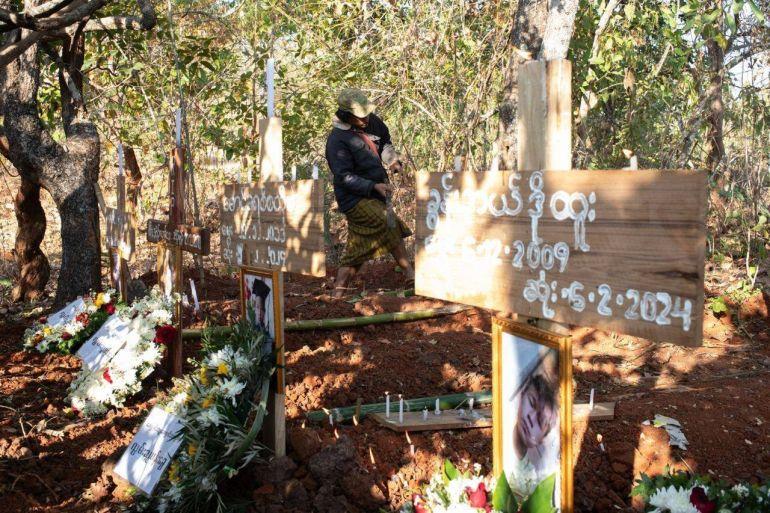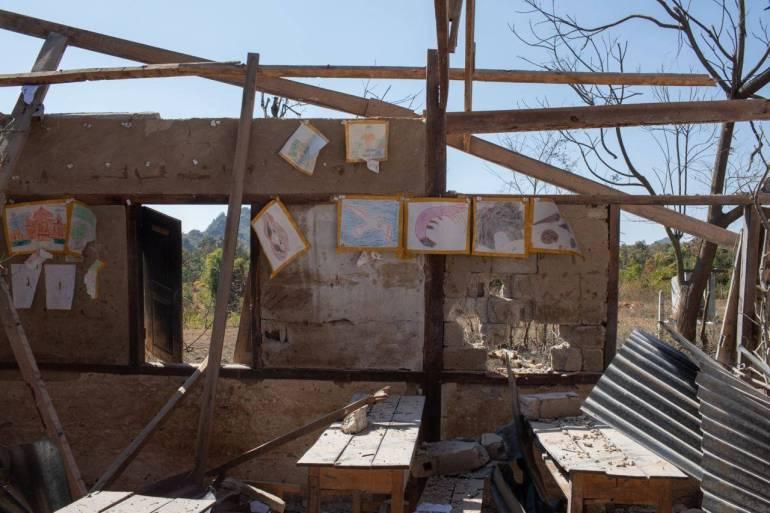Source: ALJAZEERA
ALJAZEERA MEDIA NETWORK

Women and children in regions like Karenni endure the psychological scars of military airstrikes and violent confrontations.
Since a military airstrike on her school in February, kindergarten teacher Mi Hser from Myanmar has been struggling with the trauma.
The day seemed routine in Daw Si Ei village, located in the southeastern Karenni State's Demoso township, as children engaged in their morning activities. Unbothered by the sound of a military drone, they gathered for their weekly assembly. However, just as Mi Hser stepped outside with her young son, a fighter jet unleashed an explosive attack. The aftermath left four boys dead, among them a 12-year-old, and 40 other students injured. Mi Hser blamed herself for not protecting them.
Following the attack, Mi Hser has been plagued by fear and an inability to return to her classroom. Nighttime sounds leave her on edge, constantly vigilant for another attack.
 Remains of the school in Daw Si Ei village after the military airstrike.
Remains of the school in Daw Si Ei village after the military airstrike.
Myanmar has endured three years of intense conflict between the military and anti-coup forces, marked by airstrikes, shelling, and brutal acts against civilians, actions which many believe constitute war crimes. The United Nations has reported over 3 million people uprooted from their homes, with a significant portion from the southeast, including Karenni State. The UN describes the situation as an "endless nightmare" of "unbearable suffering," holding the military accountable for the deaths of over 4,600 civilians, including women and children.
The attack on Daw Si Ei was not isolated. On the same day, a nearby village school was also bombed. Schools, initially shut down after the coup due to civil disobedience and reopening under volunteer efforts, have become frequent military targets. Mental health expert Nouf Bazaz emphasizes the profound impact prolonged conflict has on community well-being, eroding the social bonds essential for recovery, especially for children whose development can be severely affected.

Mental health services, which could alleviate some of the trauma, are scarce in Karenni State. Monica, a psychiatrist with a remote support program, notes that limited access to these services has worsened post-coup, reducing availability even further in conflict zones.
Troubles persist in Daw Si Ei, with children showing signs of trauma, such as fear of loud noises and disrupted sleep, making recovery for the community difficult. Mi Hser's daughter and son continue to exhibit stress responses. She fears the village may never regain its former joy.
Mi Htoo Htoo, who lost her son in the attack, struggles with grief, often calling out for him in unconscious moments. Despite recalling his aspirations and Sunday best attire, the memory of his violent death overshadows these thoughts. Her surviving children are also traumatized, reluctant to leave home.
Monica expresses concern over the enduring psychological impacts on children, foreseeing long-term societal consequences. In Shadaw town, located about 50 kilometers east of Daw Si Ei village, the conflict has been intense since November 2023. One evening, a military helicopter landed, bringing more soldiers. Escaping to safety, villagers later found their homes and fields violated, and tragically, multiple villagers killed.
Following the upheaval, many have fled to makeshift forest shelters, where fear and disturbed sleep continue to plague them, leaving residents like Naw Kaw Lay in a state of disconnection from reality.
Your email address will not be published. Required fields are marked *